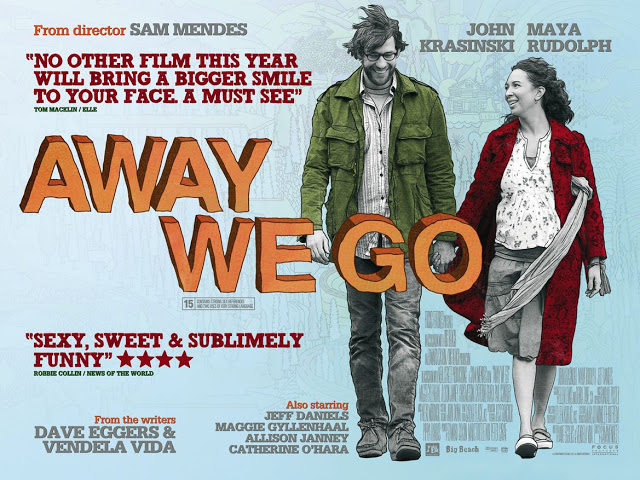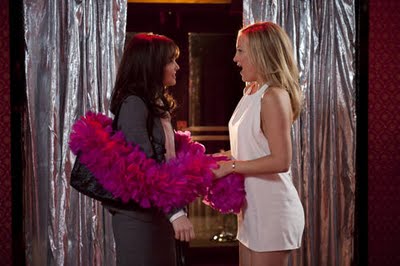 |
| Movie poster for Away We Go |
This is a guest post by LD Anderson and appears as part of our theme week on Infertility, Miscarriage, and Infant Loss.
Away We Go (2009) was part of a spate movies a few years ago that were marketed as “Indie”—with hand-drawn title cards and twee soundtracks—regardless of the film’s studio or budget or anything else. When I finally watched it on DVD, having missed it in the theater, I was disappointed. One of the main reasons was how it treated the issues of infertility and miscarriage, but I’ll get to that.
John Krasinski (The Office) and Maya Rudolph (Saturday Night Live) play Burt and Verona, a struggling thirty-something couple who unexpectedly find themselves pregnant. Verona’s parents are dead, so when Burt’s parents announce that they’re leaving the country, Burt and Verona hit the road to visit friends in search of a chosen family for their child.
 |
| Burt and Verona |
There are a few things that I like a lot about this movie, and I want to address those first. I liked the fact that Burt and Verona are an interracial couple. I appreciate the way that the movie takes the idea of chosen family so seriously. I liked the relationship between Burt and Verona, and the approach to parenting that they formulate, both informed by and different from everyone around them.
It’s everyone around them that bugs me.
In an early scene, Burt’s father—the one who’s about to bail on his first grandchild—talks to Verona about a sculpture he bought of a Native American woman. He’s not sure whether it’s Pocahontas or not, but he wants to honor indigenous people—even if he can’t pronounce “indigenous.” Later on, Burt and Verona spend time with Burt’s childhood friend, “LN,” and her husband, who practice Continuum parenting, which is a thinly veiled reference to Attachment Parenting. I’m not going to weigh in on Attachment Parenting here, but suffice it to say that it’s not portrayed positively in Away We Go. LN, however, also quotes from Alice Walker and Simone de Beauvoir.
 |
| Roderick, LN, and Bailey |
Between the two scenes, the message seems to be that only the ignorant, the insincere and the hopelessly flakey would take an interest in people of different cultures, or the words of women.
I understand that LN and her husband were meant to be a counterpoint to the comically crude couple visited before them, who were not involved enough with their children instead of too involved. For me, though, the most problematic moment came with the third family that Burt and Verona visited, which was supposed to be the most balanced.
Burt and Verona’s friends, Tom and Munch, seem to have it all—a happy, loving home with three adoptive kids. When the adults go out without the kids, they end up at amateur night at a local strip club. Munch, clad in a black dress, begins to dance for her husband to a slow song, and Tom confides to Burt that she had her fifth miscarriage earlier that week. He then waxes philosophical, wondering aloud if they’ve been “selfish” for waiting so long to start their family.
 |
| Tom and Burt |
There are so many problems with this scene, I don’t know where to begin. Whatever you believe about abortion, you can’t “owe” anything to someone who hasn’t been conceived yet. Also, women miscarry for many reasons not related to age. Infertile couples (meaning, for my purposes, couples who can’t carry a pregnancy to term as well as those who can’t conceive) suffer enough without movies telling them to second-guess themselves.
More importantly though, Tom and Munch already have a family. They are contributing the act of parenting to the world. But naturally, the subtext says, the three non-White and/or non-American kids they have at home are not enough to make them happy.
I found Tom and Munch to be hurtful caricatures of infertile couples. I understand that the desire to have children of one’s own loins is very natural, and that the inability to do so can be extremely painful. However, I would dare say that society’s insistence on considering adoption second-rate, and its complete failure to recognize childless couples as families, makes it far more painful than it has to be.
 |
| Verona and Burt |
I understand, too, that in the story, Munch’s pain was fresh, and she had another woman’s pregnant belly in her face. That only makes it more insulting that Tom barely watches her dirge-like dance, but is more engaged in whining to Burt. The message is, infertile women aren’t sexy. They’re sad.
In the end, Burt and Verona move into her childhood home, although they don’t have any chosen family nearby that I can recall. She faces the demons of her parents’ death. Whatever. By that point I didn’t even care. Burt and Verona were the only characters in the movie that I really liked. Users on IMDB described the others as “overwritten,” and the movie itself as pretentious, and I have to agree. The fail was the most memorable thing for me about Away We Go. When it comes to movies where a couple deals with infertility, I’d rather re-watch Juno. You know—the one that ends with an adoption.
———-
LD Anderson is a health insurance industry professional living in Nashville, Tennessee. She has been writing professionally about popular culture since high school and currently contributes to Popshifter.com. You can follow her (intermittently) on Twitter at @LDA_writes.


